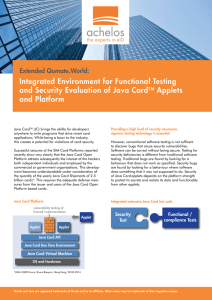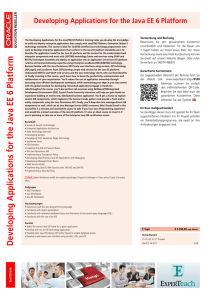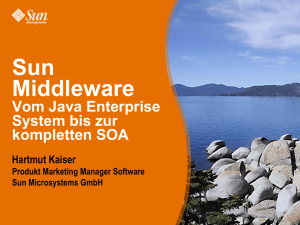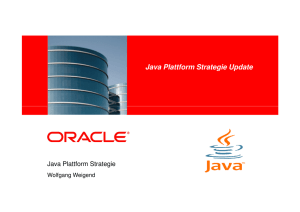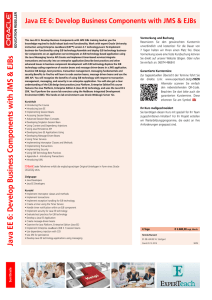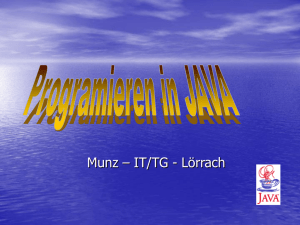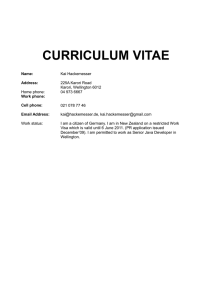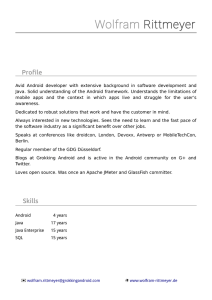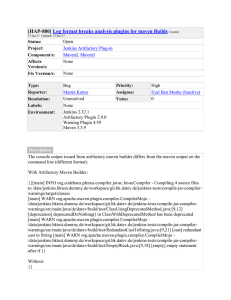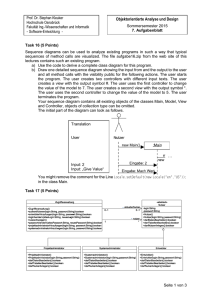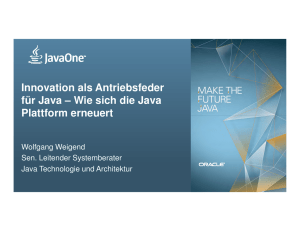austria`s e-Health System - e-card
Werbung
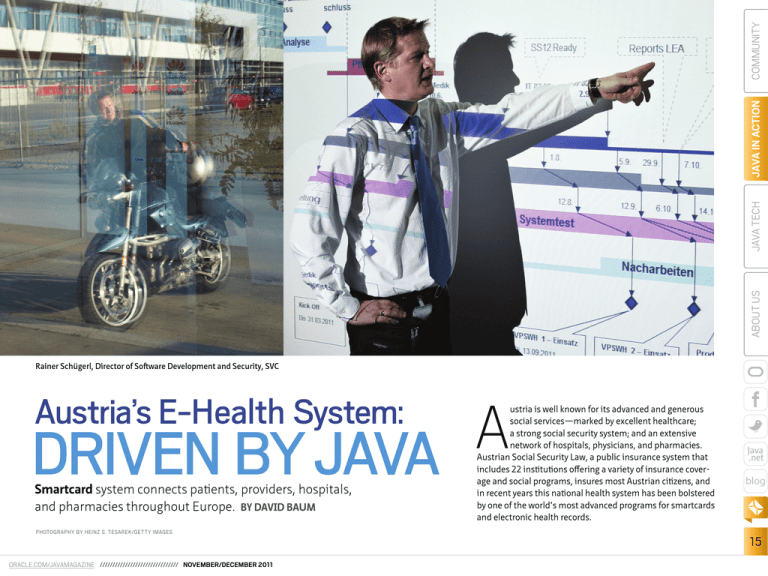
Community Java In Action Java Tech About Us Rainer Schügerl, Director of Software Development and Security, SVC Austria’s E-Health System: A Driven by java Smartcard system connects patients, providers, hospitals, and pharmacies throughout Europe. By David Baum Photography by Heinz s. Tesarek/Getty Images oracle.com/javamagazine //////////////////////////////// November/December 2011 ustria is well known for its advanced and generous social services—marked by excellent healthcare; a strong social security system; and an extensive network of hospitals, physicians, and pharmacies. Austrian Social Security Law, a public insurance system that includes 22 institutions offering a variety of insurance coverage and social programs, insures most Austrian citizens, and in recent years this national health system has been bolstered by one of the world’s most advanced programs for smartcards and electronic health records. blog 15 oracle.com/javamagazine //////////////////////////////// November/December 2011 Community Java In Action Java Tech Today all insured citizens get a smartcard that verifies their insured status and facilitates the creation, transmission, and storage of electronic health records. The e-card system also authorizes citizens to avail themselves of a variety of e-health services, from preventive checkups to disease management programs. Thousands of healthcare providers have installed special equipment to scan the smartcards and transmit secure data across a secure health information network that spans the Austrian nation and extends to many other European countries within the scope of the NETC@RDS project of the European Union. Java is the lingua franca of the system. “We chose Java because of the platform advantages, especially its tremendous portability among CPUs and hardware platforms,” says Rainer Schügerl, director of software development and security at SVC, a public entity based in Vienna, Austria, that develops innovative solutions in the field of health telematics and e-government. SVC served as the systems integrator for the e-card project. “Java provides a stable, high-quality programming language that suits all of our needs,” Schügerl adds. “For enterprisecaliber development requiring high availability, reliability, and security, most Austrian organizations use Java.” About Us Java-powered medical practice units (MPUs) and smartcard readers enable healthcare providers to read patient records and transmit health records to the SVC data center. Schügerl has 40 software engineers on his team, including 20 Java developers. Due to the sensitive nature of health and medical information, the team needed a programming language with a robust security architecture. They decided to use Java Standard Edition for Embedded Devices, which supports the same platforms and functionality as Java Platform, Standard Edition (Java SE), along with additional capabilities for the embedded market such as support for small-footprint Java runtime environments (JREs), headless configurations, and memory optimizations. Java SE is ubiquitous on servers and desktop computers, thanks to its high-performance virtual machine and exceptional graphics support. To top it off, it has an extremely lightweight deployment architecture and a complete set of features and libraries for programmers. Java applets are ideal for smartcards and similar small-memory devices because they Secure Infrastructure carry all the essential security features such The Main Association of Austrian Social as cryptography, authentication, authorizaSecurity Institutions is a group of statutory tion, and public key infrastructure. insurance providers that is responFor SVC, these features ensure sible for the country’s health, penperfect fit that new e-card applications can sion, and accident insurance. The securely access centralized reassociation enlisted SVC to design sources while protecting critical and deploy the e-card system and data from theft, loss, and corrupan associated virtual private nettion. The Java API supports a wide work. As a 100 percent subsidiary range of cryptographic services company of the Main Association including digital signatures, mesof Austrian Social Security Institusage digests, ciphers, message tions, SVC has a proven track record authentication codes, key generaof enforcing transparency and tors, and key factories, allowing security in the processing of health SVC developers to easily integrate security and administrative data, whether for clinical into their application code. use, administration, or science. Its mission The smartcard does not contain software is to improve the efficiency of information functions. Only the cardholder’s adminisprocesses among patients, health service trative data is stored on the e-card—name, providers, and health administrators. SVC has made a giant step forward in improving the quality of medical care for citizens throughout Austria and beyond. By implementing the e-card infrastructure, the agency replaced a cumbersome system of paper health insurance vouchers that had dominated Austria’s medical world for 50 years. Manual processes between insured people, employers, doctors, hospitals, and the Main Association of Austrian Social Security Institutions have been systematically replaced by electronic solutions and e-business procedures governing the transmission, storage, processing, and virtualization of health and administrative data. Java applets carry essential security features and are ideal for smartcards. blog 16 Community SVC www.svc.co.at/english Headquarters: Vienna, Austria Industry: Public services Employees: 100 Java version used: Java Standard Edition for Embedded Devices 6 oracle.com/javamagazine //////////////////////////////// November/December 2011 data from the smartcard. The MPUs contain the application software that initiates secure business procedures. They interface with another piece of equipment called a LAN chip card reader to transmit patient data to the SVC data center over a virtual private health information network. Rapid Rollout In a span of seven months, SVC rolled out 8.5 million e-cards to insured citizens, along with GINA boxes to 11,000 providers and medical practitioners. SVC continues to ship about a million e-cards every year and to bring new medical practices and health service providers on board. More than 12,500 healthcare providers now have the equipment and have been trained in the business procedures of the e-card system. For the cardholder, medical treatment is now accessible without administrative barriers and without paper documents. Physicians can verify if a person is insured and which health insurance institution will pay for medical treatment. The system verifies insurance coverage for all citizens, even when they are traveling to member states of the European Union, the European Economic Area, and Switzerland. “The card allows them to receive medical treatment in these member states, for free or at a reduced cost. The intention is to allow people to continue their stay in a country without having to return home for medical care, or to take a job in a neighboring country and keep their health benefits,” Schügerl explains. Java Tech Java In Action SNAPSHOT academic title, insurance number, serial number, gender, and user group identification—along with certificate and identity link parameters. “The e-card is used primarily as an identification tool for patients and the key to their data,” explains Schügerl. “In order to get paid, doctors insert their patients’ e-cards into a smartcard reader. The administrative patient data is then crosschecked with a central social security database, which resides in a secure data center.” Only authorized medical practitioners can read the cards and the associated health records, and they must have special equipment called medical practice units (MPUs) to do so. Commonly known as GINA boxes, each MPU is a special-purpose computer that hosts a lightweight Java program to obtain About Us Rainer Schügerl (second from right) takes a break with members of the SVC engineering team. In just seven months, SVC rolled out 8.5 million e-cards to Austrian citizens. blog 17 oracle.com/javamagazine //////////////////////////////// November/December 2011 E-cards (active) in Austria New e-cards issued Healthcare providers connected Pharmacies connected Hospitals connected Care facilities connected E-card transactions completed Average contacts per day All-time high (December 14, 2009) Global Example Following the slogan, “Move the data, not the patient,” SVC’s Java-based infrastructure has reduced the cost of healthcare Source: SVC administration, improved collaboration between healthcare professionals, and enabled higher-quality services for patients. Other Java applications communicate with the Main Association of Austrian Social Security Institutions to submit medical claims, verify pharmaceutical prescriptions, route disability reports, and transmit medical records between appropriate medical practitioners. The e-card infrastructure has become the foundation of many future applications in the burgeoning health telematics sector, including a new “citizen card” that streamlines e-government services related to tax declarations, alimony payments, student loans, criminal records, residence registration confirmations, insurance data, and pension accounts. Many other countries have expressed interest in developing similar Java-based systems, including Australia, Bulgaria, Colombia, the Czech Republic, Finland, 8,700,000 850,000 per year 12,500 120 136 15 667,763, 920 Approximately 500,000 629,150 Germany, Iran, Japan, Kuwait, Lithuania, Macedonia, the Netherlands, Poland, Romania, Serbia, Slovenia, South Korea, Taiwan, Turkey, and Vietnam. Java is the de facto standard for these smartcard initiatives, with 5 billion installations worldwide. Many technically savvy organizations come to the same conclusion as SVC: they depend on Java because it is a powerful and secure environment for applications that run on smartcards and other devices with very limited memory and processing capabilities. </article> Based in Santa Barbara, California, David Baum writes about innovative businesses, emerging technologies, and compelling lifestyles. Community SVC, a provider of health telematics and e-government solutions based in Vienna, Austria, has issued millions of e-cards to employed Austrian citizens, along with thousands of special-purpose computers that rely on Java to securely store and transmit patient data. Java In Action Stats on a Successful Rollout Java Tech SVC chose Java because of the platform advantages, especially its tremendous portability among CPUs and hardware platforms. and providers have embraced these existing and emerging e-health applications, partly as a result of the robust, Java-based security architecture. Data is not stored on the card; it is housed in a secure data center. Only authorized providers and administrators can access these records, and they must have special-purpose equipment. About Us Future Apps The e-card system has been designed to support a number of future projects, including electronic signatures for pharmaceutical prescriptions, emergency data, electronic vaccination records, and disease management programs. For example, a new e-medication system makes it easier for doctors and pharmacists to share information about potentially harmful interactions among medications. Launched as a pilot project earlier this year in three regions of Austria, smart choice this service permits pharmacists, physicians, and hospitals to see a list of each patient’s current medications. More than 100 physicians, about 50 pharmacies, and 6 hospitals participate in this project. The service will be fully implemented during 2012. “Our research shows that people 70 years and older take up to 10 medications per day,” says Schügerl. “Tracking and comparing pharmaceutical prescriptions with health records helps them to reduce negative interactions. So far about 7,000 citizens have participated in this pilot program.” Within the scope of the pilot project, the participation of patients, physicians, pharmacists, and hospitals is voluntary. After nationwide rollout of the e-medication system, citizens can “opt out” if they decide not to share their health information online—as some people prefer, due to privacy concerns. Because of the large number of involved stakeholders, it was not easy to balance the different interests and get the project running. But in general, both patients blog 18
